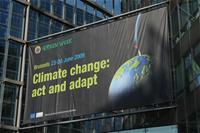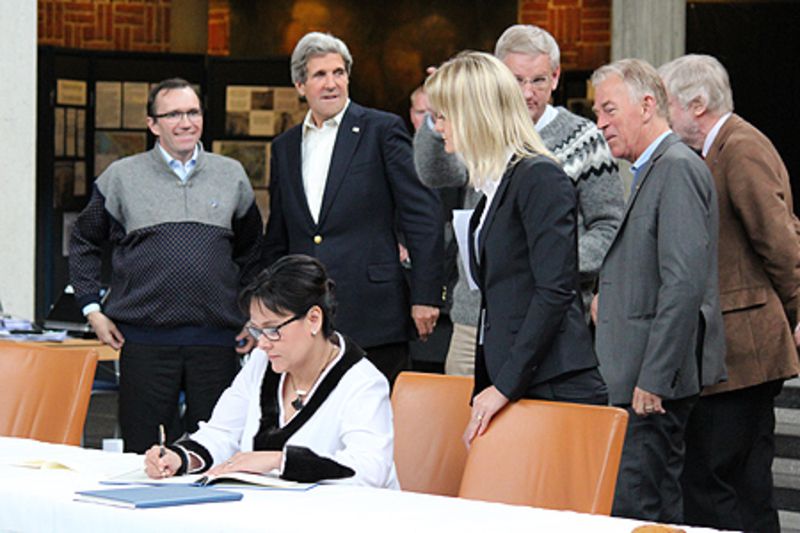Yes, we can or yes, but we can't
Adelina Marini, November 16, 2009
 Although there were fears that the climate change summit in Copenhagen is threatened by a failure, now only 20 days before its beginning the failure is almost certain. This became clear after the Asia-Pacific summit in Singapore which ended on Sunday. The American president Barack Obama conceded that the summit in Copenhagen would not produce a legally binding agreement to tackle global warming.
Although there were fears that the climate change summit in Copenhagen is threatened by a failure, now only 20 days before its beginning the failure is almost certain. This became clear after the Asia-Pacific summit in Singapore which ended on Sunday. The American president Barack Obama conceded that the summit in Copenhagen would not produce a legally binding agreement to tackle global warming.
His statement was supported by the Chinese president Hu Jintao. Both now consider Copenhagen as a "staging post" and not as an end point in the search of a global deal for global greenhouse gas emissions reduction. According to the Deputy National Security Adviser Michael Froman, the ASEAN leaders had come to the conclusion that "it was unrealistic to expect a full, internationally legally-binding agreement to be negotiated between now and when Copenhagen starts in 22 days".
And although the leaders of the region for which it is estimated that it produces almost 2/3 of the global carbon dioxide emissions, have announced that with their conclusion the door to a new climate change agreement was not closed, the fact is that it was being postponed for indefinite future.
Probably one of the reasons is that the Senate still cannot reach an agreement on the draft cap-and-trade agreement and the emissions trading schemes. This prevents the US from engaging with a concrete financial proposal to the developing countries to help their efforts to tackle climate change. This is the only way to explain the hard position of Mr. Obama in support of a new climate deal and the significant step back in the very last moment. The negotiations on the new deal started almost 2 years ago.
concrete financial proposal to the developing countries to help their efforts to tackle climate change. This is the only way to explain the hard position of Mr. Obama in support of a new climate deal and the significant step back in the very last moment. The negotiations on the new deal started almost 2 years ago.
Another unpleasant news from the Asia-Pacific countries is that it is now clear that in Copenhagen there won't be a summit but a usual meeting. In other words, the expectations that in the Danish capital all global world leaders will gather, are now fading away, in spite the fact that the final declaration from Singapore explicitly says that even if there won't be a legally binding agreement, there should be a politically binding document.
 This is part of the proposal of the Danish prime minister Lars Rasmussen who was invited in Singapore in the very last moment. The formula in the Danish proposal is "one agreement, two steps" and envisages Copenhagen to produce an agreement on the substantive issues: developed nations must agree substantial cuts to their emissions by 2020; developing countries must agree to take certain measures to curb the future growth of their emissions; rich countries must provide finance to poor countries to help them achieve their goals and cope with the effects of climate change and, last but not least - governance structures must be outlined, to deliver the above objectives.
This is part of the proposal of the Danish prime minister Lars Rasmussen who was invited in Singapore in the very last moment. The formula in the Danish proposal is "one agreement, two steps" and envisages Copenhagen to produce an agreement on the substantive issues: developed nations must agree substantial cuts to their emissions by 2020; developing countries must agree to take certain measures to curb the future growth of their emissions; rich countries must provide finance to poor countries to help them achieve their goals and cope with the effects of climate change and, last but not least - governance structures must be outlined, to deliver the above objectives.
Thus, the document in Copenhagen should outline those objectives without a legal binding but with a serious political engagement. In other words, the world leaders should take such an engagement that would be hard not to fulfill.
The idea was accepted by most of the participants in the Singapore summit. But still the big questions remain on whether in countries like China and India it is possible a public commitment to be undertaken and be implemented, given the governance structures especially in China. To sum up, the US being unable to produce a climate change legislation appears to be a real obstacle for serious and ambitious goals to mitigate climate change up to 2 degrees, as the scientists recommend.
And as far as the EU had the ambition to be a leader in this direction, now it appears that the US example is far more contageous. Since one of the biggest air polluters in the world is inclined to  postpone the "cleaning" for an indefinite time in the future, why the developing countries need to hinder their economies by taking commitments without being reassured that they will be financed by the rich (blamed for the pollution) countries?
postpone the "cleaning" for an indefinite time in the future, why the developing countries need to hinder their economies by taking commitments without being reassured that they will be financed by the rich (blamed for the pollution) countries?
For the moment, the road map for the successor of the Kyoto Protocol looks like this: a UN conference in Bonn and in December 2010 - the next climate change summit in Mexico city. Even if we assume that these two events would produce a legally binding document we have to take into account that it will be followed by a long and painful ratification procedure. And, if during that procedure there is no clear signal that the rich are ready to pay by doing so, the ratification process might stop - a movie we've already seen with the Kyoto Protocol, signed by the US but later Washington refused to ratify it.
 | © Government of Sweden
| © Government of Sweden | © КРИБ
| © КРИБ | © euinside
| © euinside